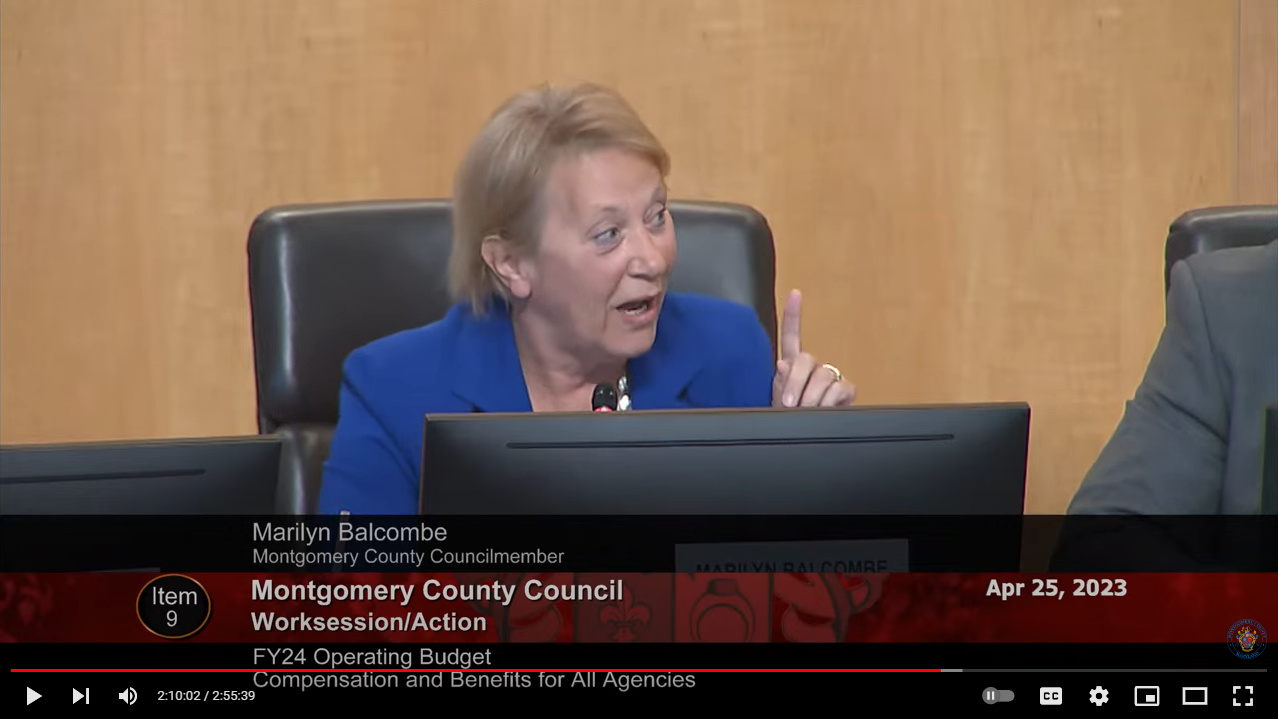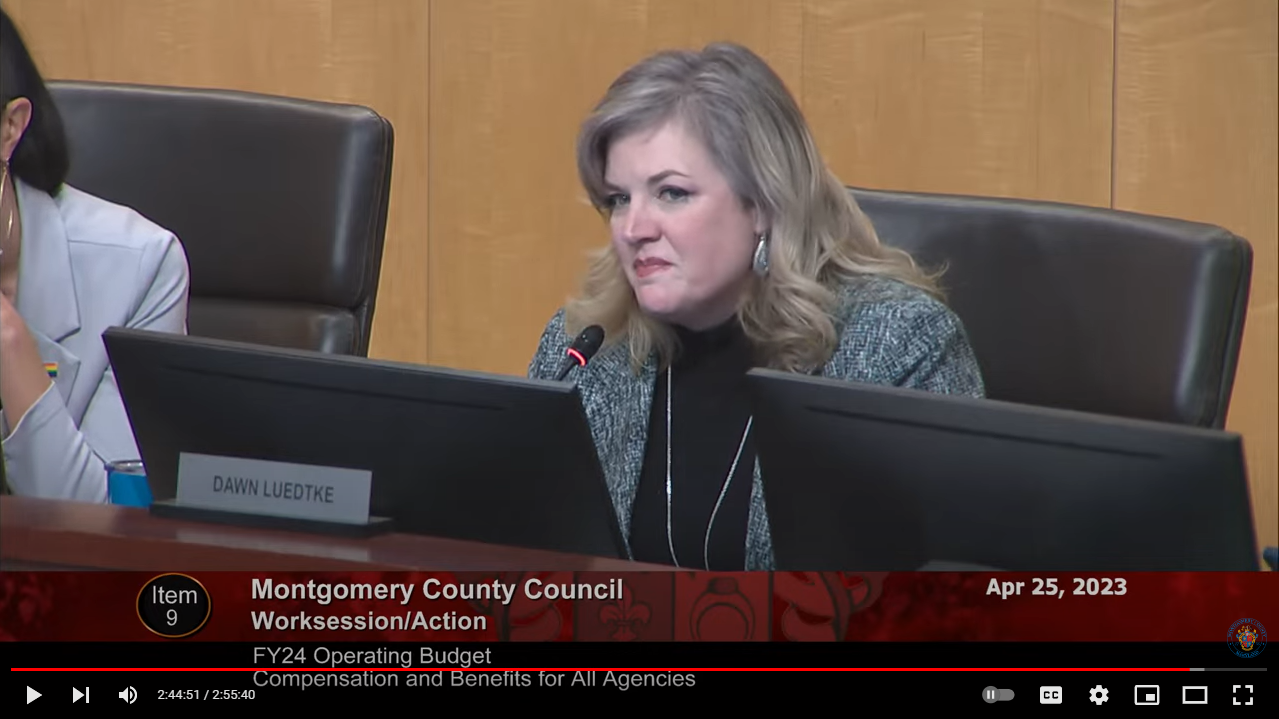By Adam Pagnucco.
Last Tuesday, the single largest component of County Executive Marc Elrich’s budget came before the county council. They were about as happy to see it as a cockroach in the bathtub. They ranted. They raved. They did everything except throw pots and pans, none of which were present on the dais. (Maybe next time!) And then they voted yes to all of it.
Let’s go over some of the ranting before we get to the voting. The item on the agenda for a vote was compensation, including the collective bargaining agreements negotiated by the executive with MCGEO, the police and the fire fighters. Those agreements provide raises of 6.0% to 13.4% and cost $100 million a year, or nearly three times the rate of revenue growth.
Council Member Marilyn Balcombe went first.
*****
The county executive has put the council in a very difficult position. The council is now faced with either passing a ten percent increase in property tax or making significant cuts to the proposed budget. And it’s impossible for each of us on the council to be an expert on any one line item in the budget which is why we rely on the committee structure and our central staff to help us make those decisions as a body. So each committee has or will painstakingly reviewed each departmental budget to identify cost savings with one very important caveat noted in every packet that I’ve reviewed: compensation will be evaluated separately. So with a roughly six billion dollar tax supported budget, $4.2 billion or 70 percent in compensation, even though the committees have spent – will spend – roughly six weeks going through this very detailed budget, the council as a body will spend one hour today to make this very important decision on compensation which leaves very little room for any substantial changes in the proposed budget.
*****
Think about that, folks. The council has to decide 70 percent of the budget in one hour. Since debt service is mandatory and the appropriations for MCPS and Montgomery College have floors established in state law, this is where most of the accessible money is. They have to deal with it in one hour.

Balcombe shows her colleagues what the number one looks like.
Balcombe then offered these comments on vacancies, which has emerged as a major issue in Elrich’s budget.
*****
As the council president already mentioned, one of the issues that we’ve been talking about is the vacancy rate. Everyone up here has, I think, publicly stated and talked about the need for transparency and accountability and in regards to staff vacancies, the lack of transparency has been astounding. We’ve all been working hard to determine how many actual vacancies are funded, how are these positions going to be filled, do we need these positions. And we have asked for information and we haven’t received information. The information we did receive from the county executive’s branch showed that some – many positions have been open for ten years – over ten years. And when we delve into that data, there’s a lot of nuance and it comes to pass that maybe they are, maybe they aren’t, so we have to have better, clear, correct data on these vacancies.
*****
Now to Council Member Gabe Albornoz, who is nicknamed “Mister Rogers” and has never been seen or photographed throwing pots or pans.
*****
I am going to support the GO [Government Operations] recommendation but I think all of us see this cliff. We’ve all been through this before. And it is not sustainable. And unless something changes, and I can’t imagine that after going through the exercise that we are going through right now with the tax increase, that that will happen again any time in the near future, then we need to, as we have in the past, work with our brothers and sisters in labor to make sure that future contracts reflect what the reality is that has been laid out in this report. Because the math here is clear. If we can’t afford the salaries we are about to pass now, a year from now, two years from now, three years from now, the only place to go to reduce the county’s budget, and when you consider over 80 percent of that budget is made up in staff and personnel, we would have to reduce staff and personnel as we’ve done in the past.
*****
Next came Council Member Andrew Friedson, who is better at budget ranting than I am. (That takes some doing!) I could write a series quoting Friedson’s budget remarks over the years, but for now, let’s settle for this excerpt.
*****
We are making a big decision today, and I support the decision ultimately that we are going to make, but something’s got to give. You know, I’ve said it before, I’ll say it again: hope is not a fiscal strategy. And this is the latest iteration of what has been a repeated insinuation that the executive’s fiscal strategy is hope, hope for federal government to bail us out with a lot of resources, hope that the economy would do a lot better than any of us expect, hope for something else to happen. But it’s a tough plank to put ourselves out there for and eventually, we’re going to get caught in that challenge. And I think we have to be concerned about that. And I think we should be concerned about that.
*****
Finally, here is Council Member Dawn Luedtke.
*****
Council Member Balcombe and I were at a CIP Fiscal Year 25 listening session Upcounty last night. But one of the things everyone wants to talk about right now, right, because that’s what’s before them and that’s what’s most on their minds… there’s obvious distress from our residents over the financial implications to individual households over some of the decisions that we all have to make. They’re really, really stressed and not happy about it.
And part of it is – are asking us repeatedly, well how do we make sure that what we’re doing, or if the money goes… I don’t want to not fund our schools, I want our schools to be great, but-but you always say there’s nothing that you all can do to make sure that happens. Because we don’t have that oversight and compliance over the school system. And there are legitimate, legitimate and numerous problems with compliance with getting things done within MCPS. I’ve got four kids in the school system. I see them not just in my own household but across the board with other students and friends and parents who are concerned.
So we have a huge job to do and we inherited this fiscal landscape and we know our hands are tied with respect to compliance, with respect to ongoing fiscal management of executive departments and I have extreme concern over the fact that our departments, putting MCPS aside since we don’t have any ability to really deal with their line items, but we can approve something that’s a budget item before us in an operating budget and then they can move up to ten percent of their budget around without our approval. Because we’re appropriating funds, it’s really just a shell game for positions that aren’t going to be filled, that aren’t really there, that haven’t been there for a very long time. And then that’s money going out the door to things that we didn’t say yes to. Or that we may spend an inordinate amount of time over the next few weeks trying to trim and then they go ahead and spend it anyway. That’s not good fiscal management.
*****

Dawn Luedtke does not like this budget.
This is more angst than is commonly found in a middle school cafeteria. So you might expect them to look for items to cut in the executive’s compensation request, yeah? If so, you would be wrong. They unanimously approved every single penny of it, passing 70 percent of Elrich’s budget in an hour.
Look council members, when you vote for something, you own it. You don’t get to criticize the executive’s fiscal management, vote for what he wants and then blame him for it. You don’t get to call something unsustainable and then say you will deal with it next year. That’s what leads to ten percent tax hikes and your own staff told you that last year and this year. None of your colleagues in the region’s other big local jurisdictions act like this, so why should you?
These council members have a choice. They can vote the way they talk. Or they can vote for one of the biggest tax hikes in Montgomery County history and explain to their constituents why they did it.
